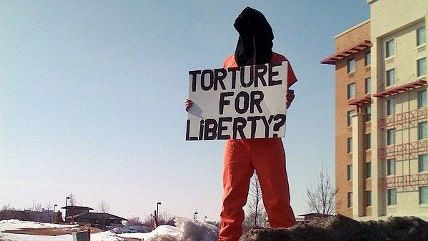500-Page Torture Report Released. Come for the Forced Enemas. Stay for the Incompetent Leadership.


After years of struggle with executive branch agencies, the Senate Select Committee on Intelligence's report on the CIA's "Detention and Interrogation Program" has been released. Download it here as a PDF and curl up in front of a good fire with some wine. A lot of it.
Obviously there's going to be a lot to look over for this, and it's sadly not clear how many people care anymore (I've already seen one tweet claiming the release of this report is intended to distract us from Jon Gruber's testimony today about Obamacare).
Here are just the headlines for the report's findings (which itself is 19 pages out of the 525 pages:
- The CIA's use of its enhanced interrogation techniques was not an effective means of acquiring intelligence or gaining cooperation from detainees.
- The CIA's justification for the use of its enhanced interrogation techniques rested on inaccurate claims of their effectiveness.
- The interrogations of CIA detainees were brutal and far worse than the CIA represented to policymakers and others.
(This is where they document that five detainees were given forced enemas)
- The conditions of confinement for CIA detainees were harsher than the CIA had represented to policymakers and others.
- The CIA repeatedly provided inaccurate information to the Department of Justice, impeding a proper legal analysis of the CIA's Detention and Interrogation Program.
- The CIA has actively avoided or impeded congressional oversight of the program.
- The CIA impeded effective White House oversight and decision-making.
President George W. Bush was not fully briefed about specific interrogation methods until 2006.
- The CIA's operation and management of the program complicated, and in some cases impeded, the national security missions of other Executive Branch agencies
- The CIA impeded oversight by the CIA's Office of Inspector General
- The CIA coordinated the release of classified information to the media, including inaccurate information concerning the effectiveness of the CIA's enhanced interrogation techniques
- The CIA was unprepared as it began operating its Detention and Interrogation Program more than six months after being granted detention authorities
- The CIA's management and operation of its Detention and Interrogation Program was deeply flawed throughout the program's duration, particularly so in 2002 and early 2003.
- Two contract psychologists devised the CIA's enhanced interrogation techniques and played a central role in the operation, assessments, and management of the CIA's Detention and Interrogation Program. By 2005, the CIA had overwhelmingly outsourced operations related to the program
The summary notes the two psychologists had no experience as interrogators.
- CIA detainees were subjected to coercive interrogation techniques that had not been approved by the Department of Justice or had not been authorized by CIA Headquarters
Things like forcing them to be naked and slapping them.
- The CIA did not conduct a comprehensive or accurate accounting of the number of individuals it detained, and held individuals who did not meet the legal standard for detention. The CIA's claims about the number of detainees held and subjected to its enhanced Interrogation techniques were inaccurate.
- The CIA failed to adequately evaluate the effectiveness of its enhanced interrogation techniques.
- The CIA rarely reprimanded or held personnel accountable for serious and significant violations, inappropriate activities, and systemic and individual management failures.
In several cases no disciplinary actions were called for even when detainees died. In one case of an improper detention, no discipline happened because "[t]he Director strongly believes that mistakes should be expected in a business filled with uncertainty."
- The CIA marginalized and ignored numerous internal critiques, criticisms, and objections concerning the operation and management of the CIA's Detention and Interrogation Program
- The CIA's Detention and Interrogation Program was inherently unsustainable and had effectively ended by 2006 due to unauthorized press disclosures, reduced cooperation from other nations, and legal and oversight concerns.
- The CIA's Detention and Interrogation Program damaged the United States' standing in the world, and resulted in other significant monetary and non-monetary costs.
That's just headlines, folks! That's a lot to chew over. In the meantime. Here is President Barack Obama's statement of response to the report's release:
Throughout our history, the United States of America has done more than any other nation to stand up for freedom, democracy, and the inherent dignity and human rights of people around the world. As Americans, we owe a profound debt of gratitude to our fellow citizens who serve to keep us safe, among them the dedicated men and women of our intelligence community, including the Central Intelligence Agency. Since the horrific attacks of 9/11, these public servants have worked tirelessly to devastate core al Qaeda, deliver justice to Osama bin Laden, disrupt terrorist operations and thwart terrorist attacks. Solemn rows of stars on the Memorial Wall at the CIA honor those who have given their lives to protect ours. Our intelligence professionals are patriots, and we are safer because of their heroic service and sacrifices.
In the years after 9/11, with legitimate fears of further attacks and with the responsibility to prevent more catastrophic loss of life, the previous administration faced agonizing choices about how to pursue al Qaeda and prevent additional terrorist attacks against our country. As I have said before, our nation did many things right in those difficult years. At the same time, some of the actions that were taken were contrary to our values. That is why I unequivocally banned torture when I took office, because one of our most effective tools in fighting terrorism and keeping Americans safe is staying true to our ideals at home and abroad.
Today's report by the Senate Select Committee on Intelligence details one element of our nation's response to 9/11—the CIA's detention and interrogation program, which I formally ended on one of my first days in office. The report documents a troubling program involving enhanced interrogation techniques on terrorism suspects in secret facilities outside the United States, and it reinforces my long-held view that these harsh methods were not only inconsistent with our values as nation, they did not serve our broader counterterrorism efforts or our national security interests. Moreover, these techniques did significant damage to America's standing in the world and made it harder to pursue our interests with allies and partners. That is why I will continue to use my authority as President to make sure we never resort to those methods again.
As Commander in Chief, I have no greater responsibility than the safety and security of the American people. We will therefore continue to be relentless in our fight against al Qaeda, its affiliates and other violent extremists. We will rely on all elements of our national power, including the power and example of our founding ideals. That is why I have consistently supported the declassification of today's report. No nation is perfect. But one of the strengths that makes America exceptional is our willingness to openly confront our past, face our imperfections, make changes and do better. Rather than another reason to refight old arguments, I hope that today's report can help us leave these techniques where they belong—in the past. Today is also a reminder that upholding the values we profess doesn't make us weaker, it makes us stronger and that the United States of America will remain the greatest force for freedom and human dignity that the world has ever known.
And here's a partial response from CIA Director John Brennan (oddly, this press release is not yet showing up on the CIA site)
As noted in CIA's response to the study, we acknowledge that the detention and interrogation program had shortcomings and that the Agency made mistakes. The most serious problems occurred early on and stemmed from the fact that the Agency was unprepared and lacked the core competencies required to carry out an unprecedented, worldwide program of detaining and interrogating suspected al-Qa'ida and affiliated terrorists. In carrying out that program, we did not always live up to the high standards that we set for ourselves and that the American people expect of us. As an Agency, we have learned from these mistakes, which is why my predecessors and I have implemented various remedial measures over the years to address institutional deficiencies.
Yet, despite common ground with some of the findings of the Committee's Study, we part ways with the Committee on some key points. Our review indicates that interrogations of detainees on whom EITs were used did produce intelligence that helped thwart attack plans, capture terrorists, and save lives. The intelligence gained from the program was critical to our understanding of al-Qa'ida and continues to inform our counterterrorism efforts to this day.
We also disagree with the Study's characterization of how CIA briefed the program to the Congress, various entities within the Executive Branch, and the public. While we made mistakes, the record does not support the Study's inference that the Agency systematically and intentionally misled each of these audiences on the effectiveness of the program. Moreover, the process undertaken by the Committee when investigating the program provided an incomplete and selective picture of what occurred. As noted in the Minority views and in a number of additional views of Members, no interviews were conducted of any CIA officers involved in the program, which would have provided Members with valuable context and perspective surrounding these events.
Throughout its 67-year history, CIA has played a critical role keeping our Nation secure, and CIA officers are rightly proud and honored to be part of an organization that is indispensable to our national security. The numerous challenges on the world stage demand the full attention, focus, and capabilities of the women and men of the CIA so that our country can stay strong and our fellow Americans remain safe. To be successful, the CIA needs to work closely with its Congressional oversight committees as we confront these challenges. With today's release of Committee documents and the CIA response, we look forward to the way ahead.


Show Comments (270)